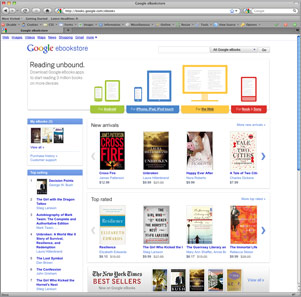Google Enters eBooks Space, Amazon Answers Back
On Monday, Google debuted their new Google eBookstore, and will now compete with Apple and Amazon for a share of the lucrative eBooks pie. As announced on the company’s official blog, consumers will be able to “browse and search through the largest eBooks collection in the world with more than three million titles including hundreds of thousands for sale.” This launch is significant in that Google eBooks are not linked to a specific device but are compatible across many platforms “— everything from laptops to netbooks to tablets to smartphones to e-readers.” The books themselves are stored in the cloud instead of on an individual piece of hardware. “That means you can access your eBooks like you would messages in Gmail or photos in Picasa – using a free, password-protected Google account with unlimited eBooks storage.”
Along with offerings from the largest publishing houses: Random House, Penguin, HarperCollins, Hachette Book Group, Simon and Schuster and Macmillan, the Google eBookstore will also carry titles from small independent booksellers around the country like Book Soup, Vroman’s, Alibris and Powell’s. This platform will give the little guys an opportunity to reach a broader customer base and compete with the Amazon behemoth. A Los Angeles Times article also reports that though Google has scanned millions of additional titles from major libraries around the world, these volumes will not be available through the eBookstore until the legal issues raised by the Google book-search have been settled.
In response to the Google eBookstore launch, Amazon released a statement on Tuesday, revealing that a browser-based feature for the Kindle will be released in the near future. “Amazon is clearly looking to take some of the shine off of Google’s new bookstore. The heart of Google’s claim Monday was that its e-book platform was not tied to any device: Its books can be read on a variety of smart phones, e-ink readers, tablets and PCs. But Amazon’s books can already be read on most of those devices, including Apple’s iPhone, iPod and iPad and Google-powered Android tablets and phones. Now that Amazon is about to have a Web interface, it’s just about caught up to Google in terms of the spectrum of devices with which it works, ” writes David Sarno for the Los Angeles Times Technology Blog.


